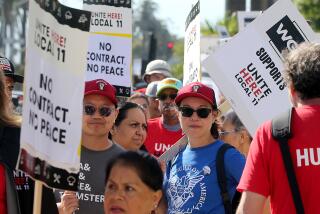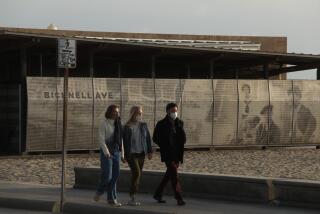Miami Tourism Boycott Over; City May Have Lost $50 Million
- Share via
MIAMI — The so-called “Quiet Riot,” a three-year-old black-led convention boycott in which tourists were urged to shun Miami to protest what was perceived as a snub of South African nationalist leader Nelson R. Mandela, was declared officially over Wednesday. The estimated cost: $50 million in lost tourism revenues.
“We believe that the business community and political leaders finally get it,” said boycott organizer H. T. Smith, a Miami attorney who announced a 20-point agreement with a host of local business and civic leaders.
The agreement includes promises to assist black-owned businesses with loans, promote trade missions to Africa and the Caribbean, provide 125 college scholarships to blacks and identify 200 successful black high school graduates working elsewhere in the United States and lure them back to greater Miami.
Merrett Stierheim, president of the Greater Miami Convention and Visitors Bureau, declined to speculate on the revenue lost to the boycott. But he agreed it was costly. “For sure, no question about it,” he said, “but the dollar damage was the lesser of my concerns. The main concern was we were sending out a signal that we are a divided community.”
Smith, 45, organized the boycott in July, 1990, days after a controversial visit by Mandela to address a labor convention in Miami Beach. To honor the African National Congress leader, who was touring the United States after being freed from 27 years of imprisonment, Smith asked that local government leaders accord him an official welcome.
The mayors of Miami, Miami Beach and metropolitan Dade County refused, citing remarks by Mandela days earlier when he expressed solidarity with Cuba’s President Fidel Castro and defended Palestine Liberation Organization chief Yasir Arafat. Thus, with very few words, Mandela outraged two of Miami’s largest and most powerful communities, Cubans and Jews.
But Smith, chairman of the anti-apartheid Coalition for a Free South Africa, was equally outraged by the snub and went to work on the boycott.
At first, the idea sounded far-fetched. While urging all tourists and conventions to stay away, Smith demanded more economic programs to help blacks, a re-evaluation of U.S. immigration policy on Haitian refugees, and apologies to Mandela. He put together a 14-minute video that reviewed Miami’s history of divisiveness and noted that a key to Dade County recently had been awarded to Robocop, a fictitious movie android.
Ultimately, the boycott proved effective. Over the last 34 months, the organizations--most predominantly black--that refused to come to Miami ranged from a group of probation officers, with 100 members, to the 5,500-member Improved Benevolent Protective Order Elks of the World.
Even as sporadic negotiations between Smith and civic leaders took place, the boycott’s success became a source of pride in Miami’s black community.
At times, the verbal exchanges between Smith and Establishment leaders, especially among Cuban-Americans, grew acrimonious. Commentators on Spanish-language radio accused some elected officials of pandering to the black community in even talking about an apology to Mandela.
But changes were made. Dade County underwent political redistricting, which resulted in more blacks being elected to office last year. Equally important, Miami Beach Mayor Seymour Gelber proclaimed a Nelson Mandela Day in 1992, and the Dade County Commission endorsed a resolution honoring him.
Only Cuban-born Miami Mayor Xavier Suarez remains a holdout.
“We will still press the city of Miami to respect black people and black leaders,” Smith said. “We have no intention of forgetting the city’s snub of Nelson Mandela.”
Smith described the agreement as a chance for blacks and Miami’s Establishment “to forge a new political and economic relationship, as full partners.”
“We have proved that there is a nonviolent and effective alternative to riots in response to frustration,” he said. “This works. We can get results.”
More to Read
Sign up for Essential California
The most important California stories and recommendations in your inbox every morning.
You may occasionally receive promotional content from the Los Angeles Times.













